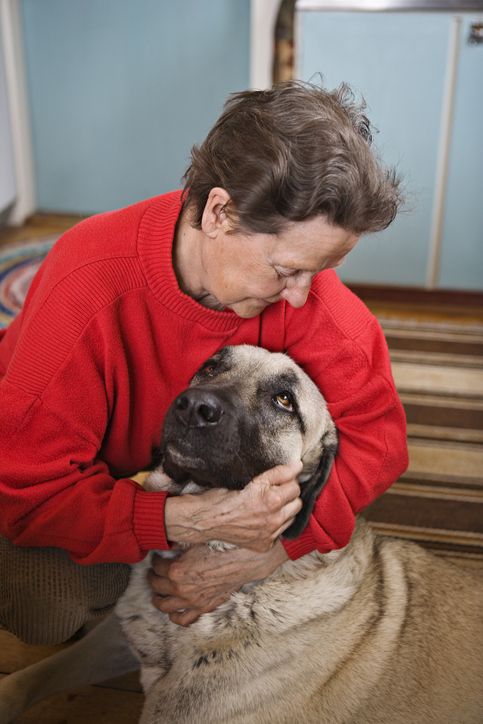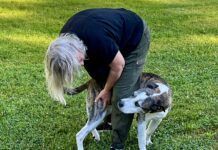
I was volunteering at my local animal shelter one day when the loudspeaker in the kennel area blared, “Kennel attendant for a dog adoption tour, please.” I went to the lobby and was introduced to a couple who, I’m guessing, were in their mid- to late 70s. I was told that they were there to meet a couple of the younger German Shepherd Dogs we had on the adoption row.
My expression probably froze for a moment, but then I put a smile on. “We have a bunch of German Shepherds and GSD-mixes right now,” I told them. “But every single one of them is a big, untrained adolescent! Are you sure you want to deal with such a big, bouncy dog?” I said it with as light a tone as I could muster, but I was concerned. These people did not look particularly strong or agile.
The husband barely acknowledged me, but the wife smiled and said, “Oh yes. We’ve had nothing but German Shepherds our whole lives. We love the breed, and want to help one who needs a home.”
I showed them the various candidates in the adoption kennels, and then a shelter employee took over, taking various dogs to meet them in the big runs outside. I left soon after, so I don’t know which – if any – of the big, strong dogs we had available for adoption they took home. But I’ve thought about the encounter many times over the past few years. It struck me as very unwise, and not particularly self-aware, that the couple would be seeking the same sort of dog they had owned throughout their younger years. I’m super experienced with stressed, large, untrained dogs who haven’t gotten out of their tiny kennels for a week, and, at 20 years younger than the couple, even I get knocked around a fair amount by those dogs in the first sessions we spend together. Even on the occasions when I’ve taken a big rowdy adolescent dog home to foster, it can take weeks or even months to teach them to control their exuberant bodies in the face of exciting stimuli.
When I admitted, a year ago, that one of the reasons I was hesitating over the decision of whether to adopt my youngest dog, Boone, when he was an adorable but thick-legged, big-pawed foster puppy of completely unknown parentage, this encounter with the senior couple was on my mind. I’ll be 60 years old this year – and, with luck, will be 75 or so when the puppy is a senior dog. I had to think about it long and hard: Did I really want to age into my retirement years with another dog who might mature into 70 or more pounds? (Of course, I did adopt that adorable puppy – and, fortunately, it looks like he will top out at about 50 pounds. I can still lift 50 pounds fairly easily, so if he’s ever sick or needs to be lifted in and out of the car, after ACL surgery, say, I can do that!)
Managing the physical size and exercise needs of a big dog is not the only potential challenge for older people adopting a dog. It’s tough to think about, but it’s a reality that people in their senior years are more prone to illnesses or injuries that render them unable to care for their dogs than younger adopters. If you inquire at your local shelter, I will bet folding money that they can point out several dogs who are there solely because their owners passed away without making arrangements for someone else to take the dogs in. In my opinion, it’s irresponsible and selfish to adopt dogs without having a backup plan – and perhaps even money set aside – for our dogs in case of our deaths.
The worst-case scenarios involve dogs whose owners died without making “in case of my death” arrangements for them, and who are completely unprepared for life in any other home. At the shelter, I’ve cared for several dogs who had never been off their property or been touched by humans other than their original (now deceased) owners. The shock and grief experienced by these dogs is awful to witness – and made worse by the fact that, in their shocked and shut-down state, it’s difficult to find someone who will give them another chance at a happy life and adopt them.
Don’t get me wrong: I can’t imagine living without a dog, ever. And I am not saying that we shouldn’t have dogs in our senior years, or even our very last days. I’m just saying that we owe the dogs we take responsibility for the same care and consideration that an owner of any age should have for their dogs. We need to have a solid plan in place for who will take them in the event of our deaths – and perhaps even a backup plan in case the first plan falls through. And we need to be able to fully care for, exercise, and train them, so that, if we are suddenly called away from this earth, our beloved dogs are healthy, socialized to others, and well behaved, so they will be welcome and cherished, not unhappy burdens, to their new owners.




